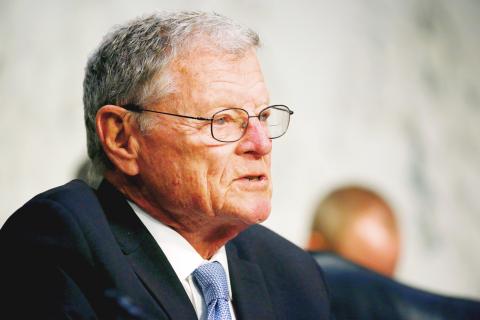Two senior US Republican senators on Monday asked US President Donald Trump’s administration to allow the sale of Lockheed Martin F-35 jets to Taiwan, saying it would help it “remain a democracy” in the face of threats from China.
“These fighters will have a positive impact on Taiwan’s self-defense and would act as a necessary deterrent to China’s aggressive military posture across the Asia-Pacific region,” senators John Cornyn, the assistant majority leader, and James Inhofe, a senior member of the Senate Committee on Armed Services, said in a letter to Trump.
“After years of military modernization, China shows the ability to wage war against Taiwan for the first time since the 1950’s,” they wrote. “However, with your leadership, it is possible to help Taiwan remain a democracy, free to establish a relationship with China that is not driven by military coercion.”

Photo: Reuters
The White House did not immediately respond to a request for comment.
Trump on March 16 signed the Taiwan Travel Act, which encourages the US to send senior officials to Taiwan to meet their Taiwanese counterparts and vice versa.
The Presidential Office in Taipei yesterday reiterated its support for the legislation.
“President Tsai [Ing-wen (蔡英文)] believes that stable relations between Taiwan and the US serve as an important foundation for peace, stability and prosperity in the Indo-Pacific region. Taiwan has the ability and is willing to work with the United States in the Indo-Pacific region to make more contributions,” the office said.
China’s Taiwan Affairs Office Minister Liu Jieyi (劉結一) told Chinese state television late on Monday that “certain Americans” were trying to play the Taiwan card, which harmed the interests of people in China and Taiwan.
“This is duping Taiwan compatriots,” Liu said, without naming any US officials. “It is futile for any outside forces to try and play the Taiwan card and doing anything to harm the interest of the Chinese people.”
The US military has put countering China and Russia at the center of a new national defense strategy unveiled by US Secretary of Defense James Mattis in January.
Other US allies in the Asia-Pacific region, such as Singapore, are also exploring the purchase of F-35s.
Lockheed said it hit its target last year of delivering 66 F-35 jets to the US and its allies.
This article has been corrected since it was first published to indicate that the Taiwan Travel Act is a public law, not a non-binding congressional resolution.

INVESTIGATION: The case is the latest instance of a DPP figure being implicated in an espionage network accused of allegedly leaking information to Chinese intelligence Democratic Progressive Party (DPP) member Ho Jen-chieh (何仁傑) was detained and held incommunicado yesterday on suspicion of spying for China during his tenure as assistant to then-minister of foreign affairs Joseph Wu (吳釗燮). The Taipei District Prosecutors’ Office said Ho was implicated during its investigation into alleged spying activities by former Presidential Office consultant Wu Shang-yu (吳尚雨). Prosecutors said there is reason to believe Ho breached the National Security Act (國家安全法) by leaking classified Ministry of Foreign Affairs information to Chinese intelligence. Following interrogation, prosecutors petitioned the Taipei District Court to detain Ho, citing concerns over potential collusion or tampering of evidence. The

NEGOTIATIONS: Taiwan has good relations with Washington and the outlook for the negotiations looks promising, Minister of Economic Affairs J.W. Kuo said Taiwan’s GDP growth this year is expected to decrease by 0.43 to 1.61 percentage points due to the effects of US tariffs, National Development Council (NDC) Minister Paul Liu (劉鏡清) said at a meeting of the legislature’s Economics Committee in Taipei yesterday, citing a preliminary estimate by a private research institution. Taiwan’s economy would be significantly affected by the 32 percent “reciprocal” tariffs slapped by the US, which took effect yesterday, Liu said, adding that GDP growth could fall below 3 percent and potentially even dip below 2 percent to 1.53 percent this year. The council has commissioned another institution

NEGOTIATIONS: The US response to the countermeasures and plans Taiwan presented has been positive, including boosting procurement and investment, the president said Taiwan is included in the first group for trade negotiations with the US, President William Lai (賴清德) said yesterday, as he seeks to shield Taiwanese exporters from a 32 percent tariff. In Washington, US Trade Representative Jamieson Greer said in an interview on Fox News on Thursday that he would speak to his Taiwanese and Israeli counterparts yesterday about tariffs after holding a long discussion with the Vietnamese earlier. US President Donald Trump on Wednesday postponed punishing levies on multiple trade partners, including Taiwan, for three months after trillions of US dollars were wiped off global markets. He has maintained a 10 percent

TRADE: The premier pledged safeguards on ‘Made in Taiwan’ labeling, anti-dumping measures and stricter export controls to strengthen its position in trade talks Products labeled “made in Taiwan” must be genuinely made in Taiwan, Premier Cho Jung-tai (卓榮泰) said yesterday, vowing to enforce strict safeguards against “origin laundering” and initiate anti-dumping investigations to prevent China dumping its products in Taiwan. Cho made the remarks in a discussion session with representatives from industries in Kaohsiung. In response to the US government’s recent announcement of “reciprocal” tariffs on its trading partners, President William Lai (賴清德) and Cho last week began a series of consultations with industry leaders nationwide to gather feedback and address concerns. Taiwanese and US officials held a videoconference on Friday evening to discuss the